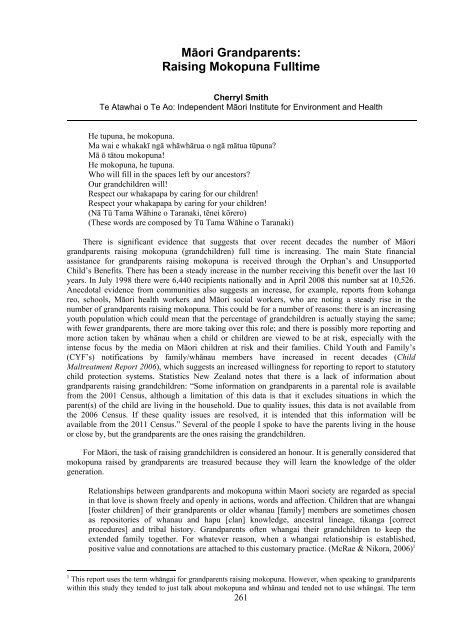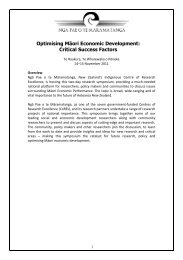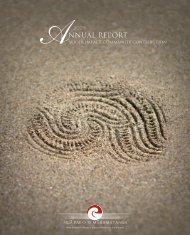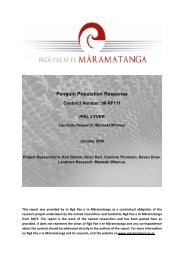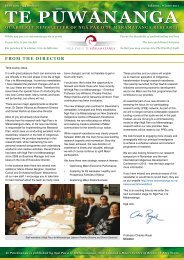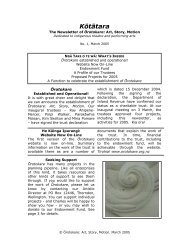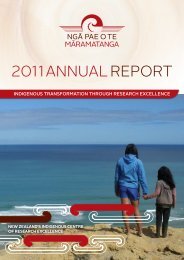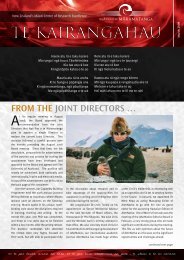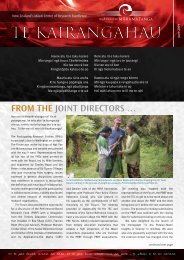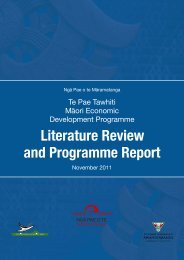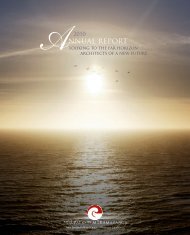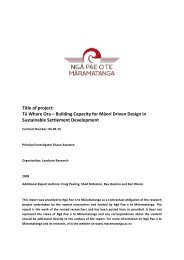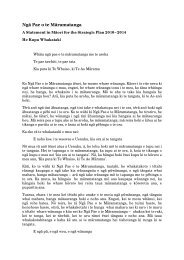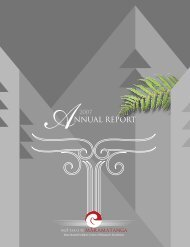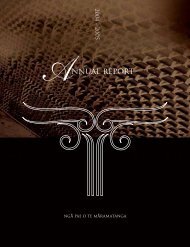traditional knowledge conference 2008 te tatau pounamu
traditional knowledge conference 2008 te tatau pounamu
traditional knowledge conference 2008 te tatau pounamu
You also want an ePaper? Increase the reach of your titles
YUMPU automatically turns print PDFs into web optimized ePapers that Google loves.
Māori Grandparents:Raising Mokopuna FulltimeCherryl SmithTe Atawhai o Te Ao: Independent Māori Institu<strong>te</strong> for Environment and HealthHe tupuna, he mokopuna.Ma wai e whakakī ngā whāwhārua o ngā mātua tūpuna?Mā ō tātou mokopuna!He mokopuna, he tupuna.Who will fill in the spaces left by our ancestors?Our grandchildren will!Respect our whakapapa by caring for our children!Respect your whakapapa by caring for your children!(Nā Tū Tama Wāhine o Taranaki, tēnei kōrero)(These words are composed by Tū Tama Wāhine o Taranaki)There is significant evidence that suggests that over recent decades the number of Māorigrandparents raising mokopuna (grandchildren) full time is increasing. The main Sta<strong>te</strong> financialassistance for grandparents raising mokopuna is received through the Orphan’s and Unsuppor<strong>te</strong>dChild’s Benefits. There has been a s<strong>te</strong>ady increase in the number receiving this benefit over the last 10years. In July 1998 there were 6,440 recipients nationally and in April <strong>2008</strong> this number sat at 10,526.Anecdotal evidence from communities also suggests an increase, for example, reports from kohangareo, schools, Māori health workers and Māori social workers, who are noting a s<strong>te</strong>ady rise in thenumber of grandparents raising mokopuna. This could be for a number of reasons: there is an increasingyouth population which could mean that the percentage of grandchildren is actually staying the same;with fewer grandparents, there are more taking over this role; and there is possibly more reporting andmore action taken by whānau when a child or children are viewed to be at risk, especially with thein<strong>te</strong>nse focus by the media on Māori children at risk and their families. Child Youth and Family’s(CYF’s) notifications by family/whānau members have increased in recent decades (ChildMaltreatment Report 2006), which suggests an increased willingness for reporting to report to statutorychild pro<strong>te</strong>ction sys<strong>te</strong>ms. Statistics New Zealand no<strong>te</strong>s that there is a lack of information aboutgrandparents raising grandchildren: “Some information on grandparents in a parental role is availablefrom the 2001 Census, although a limitation of this data is that it excludes situations in which theparent(s) of the child are living in the household. Due to quality issues, this data is not available fromthe 2006 Census. If these quality issues are resolved, it is in<strong>te</strong>nded that this information will beavailable from the 2011 Census.” Several of the people I spoke to have the parents living in the houseor close by, but the grandparents are the ones raising the grandchildren.For Māori, the task of raising grandchildren is considered an honour. It is generally considered thatmokopuna raised by grandparents are treasured because they will learn the <strong>knowledge</strong> of the oldergeneration.Relationships between grandparents and mokopuna within Maori society are regarded as specialin that love is shown freely and openly in actions, words and affection. Children that are whangai[fos<strong>te</strong>r children] of their grandparents or older whanau [family] members are sometimes chosenas repositories of whanau and hapu [clan] <strong>knowledge</strong>, ancestral lineage, tikanga [correctprocedures] and tribal history. Grandparents of<strong>te</strong>n whangai their grandchildren to keep theex<strong>te</strong>nded family together. For wha<strong>te</strong>ver reason, when a whangai relationship is established,positive value and connotations are attached to this customary practice. (McRae & Nikora, 2006) 11 This report uses the <strong>te</strong>rm whāngai for grandparents raising mokopuna. However, when speaking to grandparentswithin this study they <strong>te</strong>nded to just talk about mokopuna and whānau and <strong>te</strong>nded not to use whāngai. The <strong>te</strong>rm261


